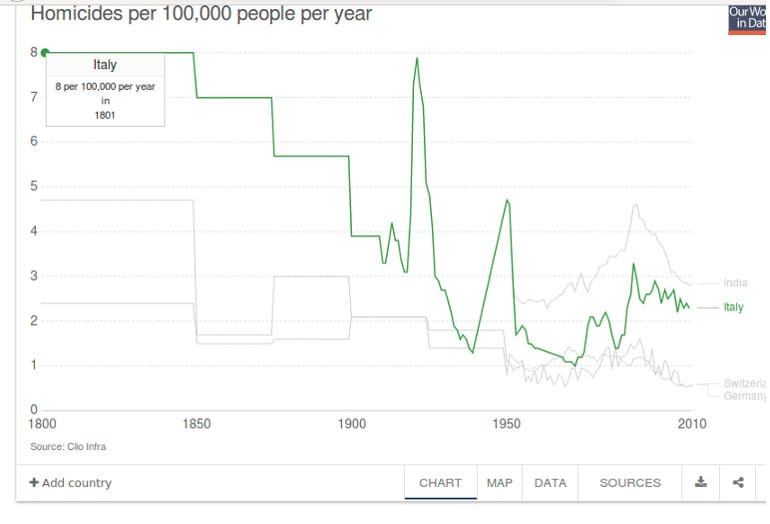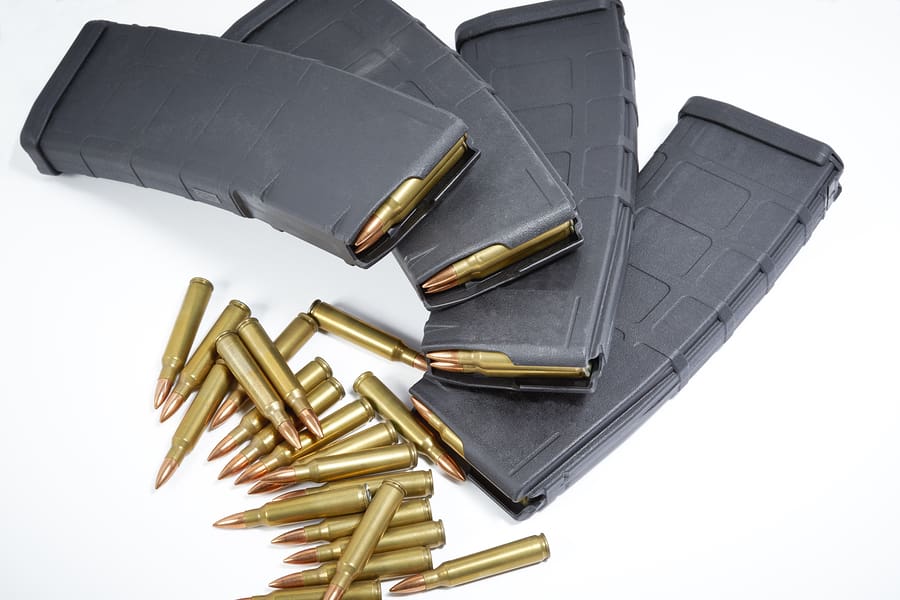Italians are beginning to questioin the reasonableness and effectiveness of their complex, strict gun control laws.
While 26 percent of people questioned in 2015 said they supported looser laws on owning a gun for self-defence, the latest research carried out by social studies institute Censis and private security sector organization Federsicurezza found that 39 percent were in favour.
The percentage was highest among people with a low level of education and the elderly, rising to 51 percent among respondents who hadn’t completed high school and 41 percent for the over-65s.
The study also found that the number of Italians with guns is rising: there were a total of 1,398,920 gun permits in Italy in 2017, an increase of nearly 14 percent in the last year. Factoring in specialist licences for trap shooting and other sports, the authors estimate that some 4.5 million Italians have a gun in the house.
Italy has a long history of brave armed men. The illustration shows an Italian saint who inspired a campaign to make him the patron saint of handgunners, Saint Gabriel Possenti.
Most of Europe lacked strong gun restrictions until after WWI. Most European gun control was instituted between WWI and WWII, as totalitarian governments sprouted across the continent. English gun control started in 1921, French in 1936.
The current Italian gun control scheme dates back to Mussolini. The laws came from a fear of political opposition.
Modern Italian gun control laws date from the Fascist period; the Public Safety Act was passed in 1931 as one of a series of measures designed to put an end to leftist violence. Addressing the Italian Senate Benito Mussolini explained:
“The measures adopted to restore public order are: First of all, the elimination of the so-called subversive elements. … They were elements of disorder and subversion. On the morrow of each conflict I gave the categorical order to confiscate the largest possible number of weapons of every sort and kind. This confiscation, which continues with the utmost energy, has given satisfactory results.”
Yet after the fall of the Fascist regime, the gun-control law remained and was gradually made even more stringent. In response to Communist terrorism in the 1970’s, a variety of laws were passed to disarm law-abiding people. More recent amendments force those who need the permit to carry firearms to demonstrate a “necessity,” and to give the government extremely personal information, such as medical certificates.
The crime rate dropped as Europe became more nationalized and educated in the 19th century, but before the gun laws were adopted. Italy tended to lag behind with a higher crime rate than Northern Europe. In the 20th century, it caught up.

The idea that gun control reduces the homicide rate is a myth. In fact, it’s mostly unrelated. Homicides were dropping before the gun control laws were put in place in 1931. Homicides were at a low of 1.3/100K of population. They rose after the gun law was passed, and peaked at 4.6/100k in 1950. Criminal homicides tend to drop during a war, but Italy lost the war.
They dropped to a low of 1.0 in 1972 (more controls put in during the 70’s), peaked again at 2.2 in 1986, 3.3 in 1991, and have dropped to .9/100K in 2015, relatively little different than they were when the whole mess started in 1939. Homicides have gone up and down in Italy, in spite of gun laws.
Now people in Italy are being exposed to more ideas of freedom and individual responsibility. Those ideas include taking responsibility for your own safety.
Currently, Italy’s rigorous gun laws require anyone who wants to buy a gun to be over 18, have a clean criminal record, get certified by a shooting range and attest that they don’t have mental health or addiction problems. Once purchased, guns must be reported to a police station and you need an extra permit to carry one in public.
And even though crime rates in Italy have remained fairly constant, Italians are feeling less safe.
The study pointed to fears over crime as possible factor in changing attitudes to guns. Around one in three Italians believe they live in an area at risk of crime, according to figures released this month by national statistics office Istat, an increase of nearly 12 percent from the last survey carried out in 2008-9. Nearly 28 percent said they didn’t feel safe going out alone in the dark, while 38 percent said that concern about crime affected the way they lived their lives.
Control whether or not a people are armed, and you control how they think. A person who has no choice to be armed will think differently than a person who can chose to be armed. Much of the push for gun control in the modern state is a desire to control how the common man thinks.
Gun control has never been about guns, but always about control. Of the populace.
©2018 by Dean Weingarten: Permission to share is granted when this notice and link are included.





Actually, English gun control began long before 1921. See Guns and Violence: The English Experience by Joyce Lee Malcom. Every time the common people became restless, the ruling classes further tightened restrictions on private ownership of firearms.
I appreciate the fact that the author of the article recognized the current British government as the totalitarian state that it is.
I have read Malcom’s Guns and Violence: The English Experience. There were previous attempts at the control of weapons in England. That is how the Englishman’s right to arms evolved, and was the basis for our Second Amendment.
But in 1920, you could go into a gun shop and buy any gun, cash, and there was no government record of the transaction. For pistols, you could walk to the post office and buy a pistol stamp, for cash, that was supposedly required before buying a pistol. The law was widely ignored, did not impose any recordkeeping requirements, and did almost nothing to prevent anyone from buying a pistol when they wanted to. It was certainly ignored for private sales.
So in 1920, before the 1921 law was imposed (and it was a dozy!) there were effectively no gun restrictions in England.
That communist revolution in Russia scared the crap out of the rulers in England and elsewhere.
The British aristocracy has always been deathly afraid of the commoners rising up against the class structure still present to this day (and in this country, although we don’t like to talk about it). If it had its way, there would still be fiefdoms and vassals and peasants Oh MY!–I mean, what kind of ‘government’ is it where petty nobility get ‘elected’ to a seat in a governing body through heredity and position (well, OK, it’s a LOT like this country, but still. . . )?
It was so bad back in 1917 that the British Government forbade King George V to give asylum to his cousin Czar Nicholas II of Russia and his family, for fear that their mere presence in Britain would foment some kind of Bolshevik revolution–and, by doing so, condemned them all to death.
Nice bunch of folks, those Brits.
they want guns to assist them in forcing their sons to move out.
Maybe they now want guns because their country is being overrun by the Muslim horde. People in Japan still don’t need guns, because their government has more common sense than the nations of the West.
Or maybe the Japanese are more culturally conditioned to think as a homogeneous group and to never question the authorities?
🤠
Or both!
No. Because the Japanese people lived under the ever constant threat of being killed by their armed upper class that their culture evolved in a hyper-polite paraody where offending another is avoided at all cost lest you invoke an incident that demands restitution. I’ve said it before and I’ll say it again: Japan is the result of an armed society becoming a polite society taken to the extreme.
You need to do some research on how the Japs do “good police work”….
Arrest first, ask questions/seek answers later..
https://elibrary.law.psu.edu/cgi/viewcontent.cgi?article=1094&context=psilr
https://www.jstor.org/stable/30209411?seq=1#page_scan_tab_contents
The people in Japan don’t have a gov’t that wants to inundate them with violent, religious extremist foreigners and they also don’t have a gov’t actively trying to kill them.
Italy, France, Germany can’t say the same and that’s why Italians want guns now. Good for them, they’re more sensible then I thought. Still Mafiaso’s, but sensible.
believe the czar’s kids were sick…thus delaying their departure..
This from a country with quite possibly, the oldest firearms manufacturer in the world.
Beretta.
My recollection is hazy, but I believe ‘Beretta’ is the oldest continually-operating gun company.
Saw a video on them once, where they showed the business ledger from the 1500’s…
I think you understate the case for Beretta, unless I’m mistaken their claim has nothing to do with firearms, I think they are the oldest continuously operating company in the world, *of any kind*, period. And yeah, something stupid like 1485.
Beretta was founded in 1526, while the world’s oldest continuously operating company, Kongō Gumi, has been around since (I kid you not) 578 AD. The oldest in Italy is the Marinelli Bell Foundry, founded 1000 AD.
Isn’t that the noodle stand by the Great Wall? (Yes, I’m serious ….)
italian gun-control aholes should read about Garibaldi & how their freedom was won
In Italy, ‘gun reforms’ mean allowing the people to keep and bear arms.
In USA, ‘gun reforms’ mean taking arms away from the people.
Having lived in Italy for 3 years, I can confidently attest that it is a far more violent place than the official crime statistics suggest. Most violent assaults go unreported. I knew several colleagues who had been violently assaulted in Milan, with one sustaining life threatening injuries. None of the perpetrators were ever apprehended by police. While the law restricted me from carrying a firearm, I always carried a knife.
I also lived there for three years, in Florence. I only felt physically threatened twice, both times by an African immigrant. The Italians are discovering that diversity is not a strength, but a weakness which lowers public trust and increases crime and social isolation. There’s a Harvard study that supports this, but its own author suppressed it for years because it was politically incorrect. I suspect that the crime statistics are similarly suppressed, and for the same reason. In any case, fascinating article. Most Italians have never so much as held a gun in their entire lives. It would be absolutely wild if they liberated themselves from their gun laws.
Diversity + proximity = war. Everywhere and always in human history.
Not necessarily war. Let’s say conflict. Less inflammatory, more accurate.
Islam, taken at merely its textual interpretation, means for there to be a war, not a conflict.
“The percentage was highest among people with a low level of education and the elderly,”
The first group lives in the most unsafe area, and the other set is most vulnerable to felony assault…
was just thinking that. Could read instead “populations most vulnerable to violence want gun possession”
Maybe Italians want gun reform and maybe I want a long weekend with Salma Hayek and maybe both of us need to get used to disappointment.
I’d drink her bath water…
After what I’ve done in it?
I’d drink DiFi’s bath water for her…
O-K. You are now officially the sickest puppy on TTAG. That took some effort.
It actually took less effort than you’d think…
I’m just naturally gifted.
The Islamic invasion will enter Italy at some point, hopefully they will be more prepared than the Brits. Or new Jersey.
The new populist government in Italy is already putting up barriers to the boats washing up on their shores from North Africa.
Merkel is increasingly isolated in Europe by her political stances on immigration and open borders. It is long overdue. She is yet another example of people making a big mistake in electing a female to run a country. People keep thinking “oh, this female could be just like Maggie Thatcher.”
No. There was only one Thatcher. Every female head of state since Thatcher has turned out to be a monumental disappointment, and Merkel is one of the worst.
Possenti … that would be a good name for a new gun manufacturer!
Turns out there’s already a society named after him: http://www.possentisociety.com/
If the new Italian populist government wants to REALLY piss of the EU they should go with what some in Europe call the ‘America model’. Will they? Probably not. Politicians by there nature crave power; they will not be willing to give that kind of power up.
Italians are beginning to questioin the reasonableness and effectiveness of their complex, strict gun control laws.
Heresy! Everyone knows gunz are bad in the hands of the mere serfs!
I dunno, maybe they are getting tired of the Fuzzy Muzzies?
Europeans have been willingly giving up their rights for decades. My wife is from Austria and we have friends all over Europe, and they are clearing living in fascist states. It’s the same old thing of people giving up their rights in order to give the government the power to ‘protect’ them while they sit around and collect entitlements. Friends in Germany are amazed at the freedom we have to express ourselves without getting arrested. In Germany you must submit the name of a newborn child for review by the government to ensure it is on the approved child name list. In Austria you can be arrested for talking about Hitler in public or for flipping someone the bird. And let’s not forget the gentleman in Britain who was arrested because he had a web site encouraging people to take up shooting as a hobby.
This is the world Liberals would like to push America into. To use their own stupid catch phrase against them . . . resist!